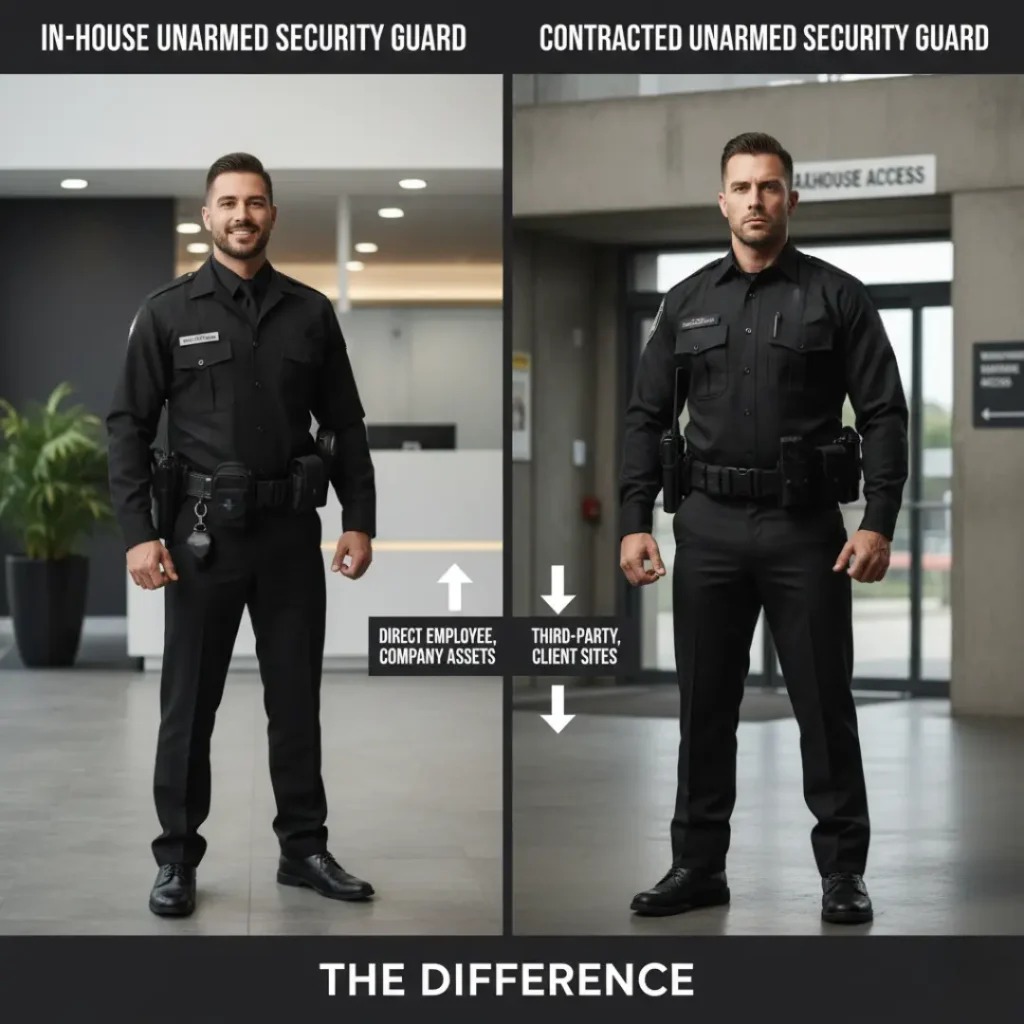Key Takeaways
- In-house guards offer more control, while contracted guards provide convenience and flexibility.
- In-house security costs more; contracted services are budget-friendly.
- Outsourcing reduces HR and management workload.
- Contracted firms offer trained, flexible, and compliant personnel.
- Contracted security shifts liability and ensures consistent coverage.
Choosing the right security solution is crucial for protecting your business, assets, and personnel. When considering unarmed security guards, organizations face a fundamental decision: whether to hire in-house staff or contract external security services. Understanding the differences between these two strategies helps industries make informed decisions that align with their security needs, budget constraints, and operational requirements.


Understanding the Core Models
Before diving into the specifics, it’s essential to define the two primary models for employing unarmed security officer personnel.
- In-House Security Guards: These professionals are direct employees of your company. You handle their recruitment, payroll, training, and management, just like any other staff member.
- Contracted Security Guards: These unarmed security guard are employed by a third-party security company. You contract with the firm for their services, and the guard company manages all the HR and operational details.
The In-House Unarmed Security Model
Building an internal security team provides a high degree of control, but it also entails significant administrative responsibilities.
Key Advantages of In-House Security
- Direct Control and Company Culture: In-house unarmed security guards are fully immersed in your company’s culture, values, and daily operations. They can develop deeper relationships with staff and clients.
- Dedicated Focus: Their loyalty and attention are undivided, focused solely on your property and assets without being rotated between multiple client sites.
- Customized Protocols: You have the flexibility to design and implement security protocols that are perfectly tailored to your specific environment.
Key Challenges of In-House Security
- Higher Administrative Burden: Your HR department must manage the entire employee lifecycle:
- Recruitment and background checks.
- Payroll, taxes, and benefits.
- Scheduling and time-off management.
- Significant Upfront and Ongoing Costs: You are responsible for all costs, including:
- Salaries, benefits, and insurance.
- Uniforms, equipment, and training materials.
- Potential overtime payments.
- Training and Compliance: Your company must ensure all security guards and unarmed staff receive state-mandated training and maintain necessary licenses, which requires dedicated resources and expertise.
The Contracted Unarmed Security Model
Outsourcing your security to a professional firm transfers much of the administrative load, allowing you to focus on your core business.
Key Advantages of Contracted Security
- Reduced Administrative Load: The security company handles all HR, payroll, taxes, and scheduling. This saves your internal team considerable time and effort.
- Cost-Effectiveness and Predictability: Contracting often involves a fixed, predictable monthly fee. This eliminates surprise costs for overtime, equipment replacement, or benefits.
- Expertise and Professional Training: Reputable security firms specialize in training. Their unarmed security personnel typically receive standardized, professional training that meets all state compliance requirements.
- Flexibility and Scalability: It is much easier to scale your security presence up or down based on seasonal needs, special events, or changing risk levels.


Key Challenges of Contracted Security
- Perceived Lower Loyalty: Contracted officers may serve multiple clients and might not develop the same deep connection to your company as an in-house employee.
- Less Direct Control: While you set the expectations, the security firm manages the personnel. Replacing an underperforming guard requires a request to the contractor.
- Variable Quality: The quality of service can depend heavily on the specific security company you choose, making due diligence in the selection process absolutely critical.
The decision between in-house and contracted unarmed security guards depends on your organization’s unique circumstances, budget, and security requirements. While in-house teams offer deep organizational integration and loyalty, contracted services provide cost efficiency, flexibility, and professional management. Most businesses find that contracted, unarmed security solutions provide the optimal ratio of quality, reliability, and value. Carefully assess your priorities, resources, and long-term security goals to make the choice that best protects your organization.
Ready to Enhance Your Security?
American Secure Company provides professional contracted unarmed security guard services tailored to your specific needs. Contact us today and discover how our experienced, unarmed security professionals can protect your business with flexibility, expertise, and cost-effective solutions.
FAQ
How long does it take to implement each security solution?
Hiring an unarmed in-house security guard typically requires 4-8 weeks for recruitment, background checks, and training. Contracted services can often be deployed within 24 to 48 hours, making them perfect for immediate security needs.
What happens if an unarmed security guard calls in sick?
With in-house staff, finding coverage falls on your management team, potentially leaving gaps in protection. Contracted security companies maintain backup personnel and guarantee replacement guards, ensuring minimal disruption to your security coverage.
Can contracted unarmed security guards provide the same level of familiarity as in-house staff?
Yes, many security companies assign dedicated guards to specific client locations for extended periods, allowing them to develop familiarity with facilities, personnel, and protocols while maintaining professional standards and accountability.
Are there liability differences between in-house and contracted, unarmed security personnel?Significant differences exist. In-house guards make your organization directly liable for their actions. Contracted services transfer most liability to the security company, which carries comprehensive insurance coverage and assumes responsibility for the conduct of its guards.
Which option offers better quality assurance for unarmed security services?
Contracted services typically provide superior quality assurance through established protocols, regular audits, and accountability structures. Security companies stake their reputation on guard performance, while in-house quality depends entirely on your internal management capabilities.





